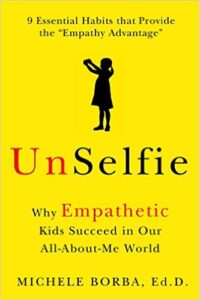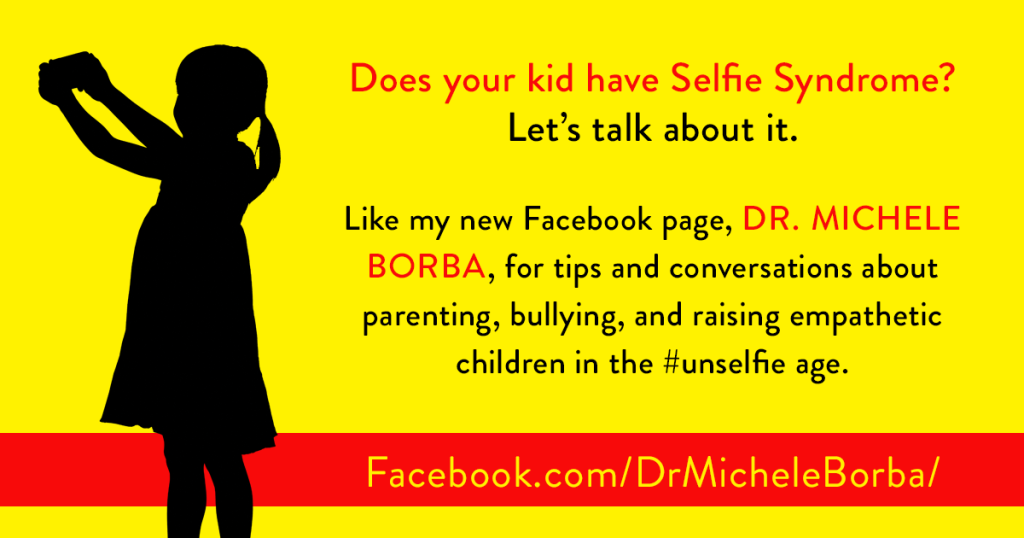The photograph is of a simple wreath of handprints. The idea came from a teacher who wanted to help her students develop strong hearts as well as minds. And so she set up an art center with construction paper, scissors, glue and marking pens. The directions were easy: “Any time someone is kind or caring to you or to someone else, trace around your hand, cut it out and glue it to the circle. Inside the hand write or draw what the person did that was kind, caring or helpful and write their name.” And in no time the teacher had a wreath filled with descriptions of kindness. Best yet, the teacher also noted that she students were looking for others those who were kind to others and her students were also kinder to each other.
The kindness wreath demonstrates an important principle of social psychology: kindness spreads! And it spreads faster in environments that foster it. That premise applies to our homes, classrooms, schools, neighborhoods and communities. Perhaps our biggest mistake: we don’t intentionally model kindness nearly enough.
Kindness is often considered as a soft and fuzzy skill, but science shows surprising benefits to being nice, including boosting health, reducing anxiety, enhancing self-esteem, increasing gratitude, and even elevating happiness.
In fact, study after study shows that a simple act of kindness also activates empathy, and that’s why I named it as one of the nine essential empathy habits in my new book, UnSelfie. The more kids practice kindness-that is, without expecting gold stars, “Citizen of the Month” awards, trophies or monetary rewards-the likelier they’ll develop the skills to succeed in work and in life and acquire what I call, “The Empathy Advantage.”
An important point to remember is that while our kids are born with the potential for empathy, kindness, caring, charitableness, courtesy, generosity (and all those other glorious traits of humanity), they aren’t guaranteed. Researchers have discovered that a strong commonality of those kids who do acquire them is how they were raised.
That means parents can be enormously influential in helping their kids be concerned about others needs by prioritizing caring, kindness and compassion in their homes.
It’s a slow, gradual evolution, but if you are consciously boosting those traits as a parent now, chances are much stronger you’ll have success and your child will develop those traits.
We seem to have a lot of “gimme” kids these days and it’s because they’ve learned that their parents will oblige their every whim. (And materialism and self-centeredness are known reduce empathy and compassion). So don’t! Establish guidelines and stick to them. Such as?
Try this:
My girlfriend noticed her mother-in-law was overindulging her kids in material gifts and finally told her that was not the kind of kids she wanted to raise. She asked her to please reduce their number of presents and put the money instead in their college fund. And I can tell you that her children (now grown) are very kind-hearted, loving kids who are concerned about others .. not what they own.
The key is that the mom determined how she wanted her kids to turn out, and then consciously begin raising them that way. Instilling character and nurturing compassion involves intentional parenting. So gradually stretch your child to think about other people’s concerns and needs.
Here are four ideas that might help you raise a more caring, kind children and help them reap The Empathy Advantage.
Switch roles
The next time there’s a conflict between your child and a friend (or between you and your child) ask her to stop and think how the other person would feel if the roles were reversed. Then ask her to talk about the problem as if she were the other person:
“What would the other person say?”
“How would you feel if you were the other person?”
“What do you think the friend would want to do?”
“If you were in your friend’s shoes, what would he/she want to tell you?”
If she is very young, it is helpful to use puppets so that each puppet can represent the person in the conflict. It builds empathy.
Call attention to insensitive behavior
Any time your child acts unkindly, use it as an opportunity to help him become more sensitive to the feelings of other people. Just point out the impact of her actions:
“Telling Bert to leave because you wanted to play with Sally was inconsiderate. How would you feel?”
“Not asking Daddy if he wanted to watch a TV show was unkind. How would you feel?”
Be an example of caring, kindness and generosity
Try to find natural ways to help her “give” to others, so she understands the joy giving can bring. Start by doing it yourself and having her watch and do it with you. Here are a couple of ideas:
“The neighbor is sick; let’s make an extra bowl of soup and bring it to her.”
“Daddy is so tired; let’s surprise him and stack the newspapers so he doesn’t have to.”
Make “giving” natural and fun but help your children learn to GIVE. And help them learn to do so without expecting anything in return.
Expect your child to share and consider others
This is one of the first moral behaviors we need to tune up in our kids starting at around 2 or 3 years of age. When he is two you can structure his sharing: “It’s his turn, then your turn, then his turn.” Little kids sometimes need an oven timer as a reminder that the other person should still be allowed to play with the toy. Before friends come over, structure “sharing” by asking him:
“What things will you share with your friend?”
“What do you think he would like to play?”
Put away things that are very special that may cause problems. What’s important on this one is to help your child learn to think of others’ needs and feelings.
The Reality Check here is that while our children are hard-wired to care, that capacity must be nurtured for it to develop. So be intentional about raising a caring child! And then keep finding those opportunities for your children to practice kindness until it becomes a part of their mind-set and your kids can describes themselves as “Caring People.”
Best!
Michele
Dr. Michele Borba, Parenting Expert
 I am an educational psychologist, parenting expert, TODAY show contributor and author of 22 books. You can also refer to my blog, Dr. Borba’s Reality Check for ongoing parenting solutions and late-breaking news and research about child development.
I am an educational psychologist, parenting expert, TODAY show contributor and author of 22 books. You can also refer to my blog, Dr. Borba’s Reality Check for ongoing parenting solutions and late-breaking news and research about child development.
My new book, UnSelfie: Why Empathetic Kids Succeed in Our All-About-Me World will be in print June 2016. (Yahoo!) I’ve spent the last five years researching and writing this book as well as literally flying around the world to find the best ways we can activate our children’s hearts. My goal is to create a conversation that makes us rethink or view of success as exclusively grades, rank and score and includes traits of humanity! It’s filled with common-sense solutions based on the latest science to help us raise compassionate, caring, courageous kids. It’s time to include “empathy” in our parenting and teaching!


